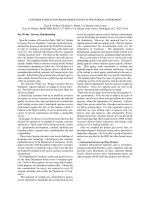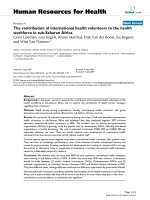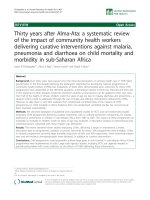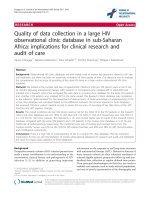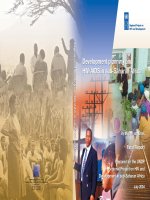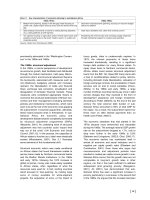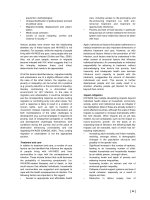Issues in the contemporary politics of sub saharan africa the dynamics of struggle and resistance
Bạn đang xem bản rút gọn của tài liệu. Xem và tải ngay bản đầy đủ của tài liệu tại đây (708.02 KB, 203 trang )
Issues in the
Contemporary Politics of
Sub-Saharan Africa
The Dynamics of Struggle and Resistance
Graham Harrison
Issues in the Contemporary Politics of Sub-Saharan Africa
By the same author:
THE POLITICS OF DEMOCRATIZATION IN RURAL MOZAMBIQUE
Issues in the
Contemporary Politics of
Sub-Saharan Africa
The Dynamics of Struggle and Resistance
Graham Harrison
Department of Politics
University of Sheffield
© Graham Harrison 2002
All rights reserved. No reproduction, copy or transmission
of this publication may be made without written permission .
No paragraph of this publication may be reproduced, copied or
transmitted save with written permission or in accordance with
the provisions of the Copyright, Designs and Patents Act 1988,
or under the terms of any licence permitting limited copying
issued by the Copyright Licensing Agency, 90 Tottenham Court
Road, London W1T 4LP.
Any person who does any unauthorised act in relation to this
publication may be liable to criminal prosecution and civil
claims for damages.
The author has asserted his right to be identified as
the author of this work in accordance with the Copyright, Designs
and Patents Act 1988.
First published 2002 by
PALGRAVE MACMILLAN
Houndmills, Basingstoke, Hampshire RG21 6XS and
175 Fifth Avenue, New York, N.Y. 10010
Companies and representatives throughout the world
PALGRAVE MACMILLAN is the new global academic imprint of the
Palgrave Macmillan division of St Martin’s Press, LLC and Palgrave
Macmillan Ltd. Macmillan® is a registered trademark in the United
States, United Kingdom and other countries. Palgrave is a registered
trademark in the European Union and other countries.
ISBN 0–333–78635–1 hardback
ISBN 0–333–98725–X paperback
This book is printed on paper suitable for recycling and
made from fully managed and sustained forest sources.
A catalogue record for this book is available from the British Library.
Library of Congress Cataloging-in-Publication Data
Harrison, Graham, 1968–
Issues in the contemporary politics of Sub-Saharan Africa: the
dynamics of struggle and resistance/Graham Harrison.
p. cm.
Includes bibliographical references and index.
ISBN 0–333–78635–1
1. Democratization – Africa, Sub-Saharan. 2. Peasantry – Africa,
Sub-Saharan – Political activity. 3. Rural poor – Africa, Sub-Saharan –
Political activity. 4. Rural development – Africa, Sub-Saharan. 5. Africa,
Sub-Saharan – Politics and government – 1960– I. Title.
JQ1879.A15 H34 2002
320.967–dc21
10 9 8 7 6 5 4 3 2 1
11 10 09 08 07 06 05 04 03 02
Printed and bound in Great Britain by
Antony Rowe, Chippenham and Eastbourne
2001058054
Contents
Acknowledgements
vii
List of Abbreviations
ix
Map: Contemporary Africa
xi
1
Introducing Political Struggle as Contemporary African
Politics
Analysing political struggle
Structure and struggle
Africa and the politics of representation
Further reading
1
2
10
14
22
2
Peasants, Politics and the Struggle for Development
Moving beyond the prejudices
Conceptualizing the peasantry
Peasants and culture
Exit the peasant and enter the smallholder?
Which way forward?
Peasant–State relations
Concluding remarks
Further reading
23
23
26
34
37
39
40
48
49
3
The Politics of Debt and Social Struggle
Introduction
The creation of a permanent crisis
The social repercussions of structural adjustment
Understanding politics and resistance in the age of
structural adjustment
Further reading
50
50
51
58
4
Contesting Democratization
Introduction
Evaluating change
Democratization and political activity
Recognizing the limits
Structure and struggle
Western involvement in democratization
Conclusion
Further reading
74
77
78
78
81
84
90
94
97
103
104
vi Contents
5
New African Identities, New Forms of Struggle?
Introducing political identity
Culture, identity and class
Youth, violence and urban protest
Towards a resolution of identity, class and struggle
Further reading
105
105
111
115
120
123
6
Political Struggle as History
Mozambique
Nigeria
Burkina Faso
Conclusion
Further reading
124
124
135
145
153
154
7
Defending the Ideal of Struggle
The death of political struggle?
Political struggle and ‘liberation’?
155
155
158
Bibliography
160
Index
187
Acknowledgements
This book is a product of five years teaching African politics, and the
time provided to me to write by Tony Payne during my first year at the
University of Sheffield.
I would like to thank Alison Howson at Palgrave for her support and
flexibility during the book’s preparation. External readers’ comments
on the project were also very helpful.
Thanks also to Jane, Jack and Lydia for too many reasons to
mention.
This book is dedicated to Carlos Cardoso – Mozambican journalist
assassinated in November 2000 – and the struggles he pursued.
vii
This page intentionally left blank
List of Abbreviations
AICAJU
ANC
CCM
CDR
CMEA
CZI
DRC
ESAP
FORD
FRELIMO
GEAR
HIPC
IFI
IMF
LIPAD
MDC
MMD
MOP
MOSOP
NGO
NLC
NPC
NPN
NRM/A
NRP
ONUMOZ
PAMSCAD
PDP
PNDC
PRE
quango
Renamo
RPA
Cashew Industrial Association (Mozambique)
African National Congress
Communist Party of Tanzania (Chama cha Mapinduzi)
Committee for the Defence of the Revolution (Burkina
Faso)
Council for Mutual Economic Assistance
Confederation of Zimbabwean Industries
Democratic Republic of Congo
Economic and Social Adjustment Programme
Forum for the Restoration of Democracy
Mozambique Liberation Front
Growth Employment and Redistribution Programme
Highly Indebted Poor Country
international finance institution
International Monetary Fund
Patriotic League for Development (Burkina Faso)
Movement for Democratic Change
Movement for Multiparty Democracy
mode of production
Movement for the Survival of the Ogoni People
(Nigeria)
non-governmental organization
Nigeria Labour Congress
Northern People’s Congress (Nigeria)
National Party of Nigeria
National Resistance Movement/Army (Uganda)
National Republican Party (Nigeria)
United Nations Operation in Mozambique
Programme for the Amelioration of the Social
Consequences of Adjustment
Popular Development Programme (Burkina Faso)
Provisional National Defence Council (Ghana)
National Reconstruction Programme
quasi-autonomous non-governmental organization
Mozambique National Resistance
Rome Peace Agreement (Mozambique)
ix
x List of Abbreviations
SAL
SAP
SDP
SINTIC
SWAPO
TANU
UDI
UN
UNDP
UNECA
UNIP
WAI
WENELA
ZANU
ZAPU
ZCTU
Structural Adjustment Loan
Structural Adjustment Programme
Social Democratic Party (Nigeria)
Cashew Workers Union (Mozambique)
South West Africa People’s Organization
Tanzania African National Union
Unilateral Declaration of Independence
United Nations
United Nations Development Programme
United Nations Economic Commission for Africa
United National Independence Party (Zambia)
War Against Indiscipline (Nigeria)
Witwatersrand Native Labour Authority
Zimbabwe African National Union
Zimbabwe African People’s Union
Zimbabwe Congress of Trade Unions
Map: Contemporary Africa
Tunis
Algiers
MOROCCO
TUNISIA
Rabat
Tripoli
Western Sahara
(Claimed by
Morocco)
CAPE
VERDE
Praia
Cairo
ALGERIA
LIBYA
EGYPT
MAURITANIA
MALI
Nouakchott
NIGER
SENEGAL
THE
Dakar
BURKINA
GAMBIA
Niamey
Banjul
Bamako FASO
Ouagadougou
GUINEA-BISSAU GUINEA
Bissau
Conakry
BENIN NIGERIA
Porto Novo
Freetown
GHANA
Abuja
SIERRA Monrovia
Accra
LEONE LIBERIA
COTE D’IVOIRE
Yamoussoukro
Lome
EQUATORIAL GUINEA
DJIBOUTI
Djibouti City
ETHIOPIA
Yaounde
Bangui
Malabo
Sao Tome
Asmara
SUDAN
Ndjamena
CENTRAL AFRICAN
CAMEROON REPUBLIC
TOGO
SAO TOME
and PRINCIPE
ERITREA
Khartoum
CHAD
RWANDA
Kigali
Libreville
DEMOCRATIC
GABON
REPUBLIC OF
CONGO THE CONGO
Addis
Ababa
SOMALIA
UGANDA
Kampala
KENYA Mogadishu
Nairobi
Brazzaville
Kinshasa
BURUNDI
TANZANIA
Bujumbura
Luanda
Dodoma
SEYCHELLES
Victoria
ANGOLA
Moroni
Lilongwe MALAWI COMOROS
Lusaka
Harare
ZIMBABWE MOZAMBIQUEAntanananvoMAURITIUS
Port Louis
ZAMBIA
NAMIBIA
Windhoek
MADAGASCAR
BOTSWANA
Gaborone
Pretona
Maputo
SWAZILAND
SOUTH
AFRICA
Mbabane
LESOTHO
Maseru
xi
This page intentionally left blank
1
Introducing Political Struggle as
Contemporary African Politics
Politics are thought and fought.
(Therborn, 2001: 87)
History is as much about Mandelas as it is about Malans.
(Allen, 1999: 470)
What do we mean when we speak of ‘African politics?’ Simple answers
to this question would be foolhardy (Young, 1999), but much useful
discussion has revolved around the concepts and issues which are
central to the asking of this question. My aim in this book is to outline
a conceptualization of political struggle and demonstrate the enduring
importance of struggle in any understanding of African politics. This is
not to say that ‘struggle is everything’; certainly there is much empirical material to demonstrate the salience of political disengagement,
Machiavellian strategies of power-seeking and the intermixing of political actions/strategies in particular local contexts. But, because there is
a striking decline in academic attention paid to struggle, I justify this
more parochial contribution as making a worthy point: it would be
wrong to abandon a concept of political struggle when discussing how
to answer the grand question that commences this book.
By paying particular attention to political struggle, the book offers a
different ‘angle’ on the political analysis of a continent which is principally represented as a place of repression, authoritarianism and generalized decline. A great deal of the existing work on African politics has
outlined and analysed the ways in which African societies have been
the theatres for dictatorships, conflicts and poverty. There are obvious
1
2 Contemporary Politics of Sub-Saharan Africa
empirical reasons for this focus, and this book does not try to deny the
dire situation that much of Africa faces. But the general impression left
by this literature does violence to Africa’s image. It produces images of
passivity, helplessness and incompetence. It also produces images of
innate violence and malice. We will return to the question of representation shortly, but it is important to note here that the general
image evoked by these notions is misleading because it ignores the
capacity of African societies and social groups to innovate, resist,
challenge and elaborate new ideals of liberation in the face of the dire
forces that produce the orthodox images of Africa. The message is not
one of naive optimism, and far less of diagnostic-style programme
building, charting ‘a way forward’ for a particular country or, more
heroically, an entire continent. Rather, the point is clearly to argue
that all forms of oppression produce their own seeds of resistance and
all structures of inequality yield struggles for transformation. A genuinely measured analysis of African politics must take adequate
conceptual account of the diversity of African agencies (collective and
individual) based in dynamics of resistance.
This book will maintain a focus on popular struggle for this reason. It
begins by analysing the tensions and contradictions that form the politics of peasant farmers in Africa because peasant farmers are both the
most populous class in Africa and constitute those who are, by and
large, the most remote from the centres of state power. Subsequently
we will look at two key contemporary processes in Africa, structural
adjustment and democratization, paying particular attention to struggles
and political action. This is followed by an analysis of other forms of
political action and struggle embedded in the elaboration of collective
political identities, forged along the lines of work, migration or age. The
next chapter takes three country case studies to illustrate the importance of struggle to postcolonial historiography. The concluding
chapter takes a more reflective perspective, considering the prospects of
an ideal of struggle. The rest of this chapter will deal with issues of
methodology: how to analyse struggle, how to conceptualize ‘African
politics’ and what boundaries to establish in the analysis of political
struggle.
Analysing political struggle
Any analysis of political struggle must necessarily (but with varying
degrees of explicitness) involve a normative component. The notion of
struggle necessarily projects an ideal, or an end point which evokes an
Political Struggle as Contemporary African Politics 3
ideal situation or state of affairs, that is a condition in which a certain
kind of struggle is no longer necessary. This ideal cannot be anything
but normatively constructed, that is based on notions of what should
be. Researchers might demur from making these normative positions
clear, perhaps because – as with many liberal writers – they consider
them self-evident and universal, but they always exist within the logic
of an argument (e.g. see Jones’s (2000) analysis of relativism). Normative postures can create problems, however, as implicit norms can
easily appear as prejudices in the eyes of the reader. For this reason, I
will be explicit about the normative framework of this book.
The book takes as its starting point the centrality of capitalism as a
social system which has generated contradictions, forms of oppression
and processes of exploitation. These phenomena take specific historical
forms in different African societies: there is no universal ‘base’ upon
which then to place forms of struggle as effects of the system.
However, there are important generic characteristics to these phenomena: exploitation, oppression, and contradiction are hardly intrinsically capitalist phenomena, but there are specific forms of exploitation
which derive from the fact that they occur within a capitalist global
political economy. Responses to these phenomena, while not complying to some form of ‘logic’ demanded by an economic process, can
hardly be seen as disengaged from the former’s capitalist form.
Furthermore, recognition of the centrality of capitalism and its political economy does not necessarily impute some specific functionalism
to our analytical methodology. What it does do is privilege an integrated set of processes which give our understanding of struggle a particular content based in class relations, popular claims on social surplus
and the relation between accumulation and notions of social justice.
These points will be returned to later, but let us first relate the political
economy of capitalism to our region of interest. There are four key features to capitalism’s historical impact on sub-Saharan Africa which
allow us to locate sub-Saharan Africa within the combined and uneven
development (Rosenburg, 1996) of the world system.
Colonialism
It is debatable whether colonialism was an expression of the desire of
European capital to expand its accumulation or a political rivalry
between nation-states (see, for example, Freund, 1988). European
powers certainly displaced their capitalist rivalries into the conquest of
African territory, embodied most clearly in the Treaty of Berlin (1884)
which constituted a ‘handshake over new African boundaries at
4 Contemporary Politics of Sub-Saharan Africa
European conference tables’ (Freund, 1988: 90). Because capitalism is
best understood as a form of society, not just an economy, it seems
something of a false dichotomy to disentangle a supposed political and
economic aspect to the colonial moment. From this perspective, we
can discern two key effects of colonialism on African societies.
The creation of a national economy
National economies were constructed by European states and their
colonial state progeny. From the late 1800s, and particularly in the
1920s, European capital was invested in infrastructural development
(Iliffe, 1996: 212; White, 1993) such as ports, dams, telegraph systems
and railways. These investments constituted the sinews through which
broader social change took place. Colonial states imposed (via compulsory cropping) and regulated (via marketing boards and the imposition
of taxes) the integration of African farmers into global markets, a
process we will detail as peasantization in the following chapter. New
working classes emerged at the ports and in the homes of European
elites as cooks, servants, gardeners and guards. Some farmers – including lineage chiefs – became small-scale capitalists. Trading classes,
often based on older patterns of trade, grew: in East Africa immigrant
Asian communities became merchants and later owners of industries,
as did Levantine communities in West Africa. There is a wealth of historiography detailing the complexities and variations of these
processes (some of the best being: Cooper, 1987; Kitching, 1980; Brett,
1973; Mamdani, 1976), but for our purposes here it is important to recognize that colonialism ushered in a quickening pace of class formation (Sender and Smith, 1986), associated with direct foreign
investment (private and public) and the development of capitalist
markets, heavily regulated by colonial states. All of this took place
within the boundaries of nation-states, which brings us to the second
key feature of colonialism.
The creation of a nation-state
Before colonialism, Africa’s political geography was very fluid and
varied. The orthodox distinction offered to understand pre-colonial
political geography is between centralized and segmented societies, but
this obscures as much as it reveals as pre-colonial states expanded and
retracted and patterns of trade and migration often linked individual
societies. Colonialism imposed an alien political geography on Africa,
based on absolute distinct borders and sovereign states. These states
were made in the image of colonizing European powers, not with refer-
Political Struggle as Contemporary African Politics 5
ence to African social realities. Despite some valid criticism, Alavi’s
(1972) metaphor of the overdeveloped state seems to encapsulate the
initial construction of nation-states in Africa: states which derived their
characteristics from Europe rather than Africa which existed ‘over’ or
above African society.
The apparatus of the state prosecuted and reflected the prevalent
violence of colonialism (contrary to images of a pax colonia): a police
force, chieftaincy, military, networks of informants, all designed to
enforce colonial domination. Economic instruments were designed to
extract resources from Africans and to facilitate the expansion of
foreign capital. In time, some states would begin to elaborate forms of
economic nationalism which conflicted with the model of colonial
state as a handmaiden for the metropole; this was most clear in those
colonial states where significant numbers of European settler farmers
emerged (Berman and Lonsdale, 1991; Smith, 1991; Arrighi, 1966;
Pankhurst, 1995). The colonial nation-state also established a central
and enduring contradiction: the aspiration to create a nation with a
fairly homogenous citizenry in a social landscape defined by ethnic
plurality and systems of migration and cultural intercourse which
often violated the boundaries drawn up in Berlin (Davidson, 1992).
Economic integration
African societies have been integrated into broader economic systems
for as long as any other region of the world. Trans-Saharan trade has
connected Africa to Europe since classical times; Indian Ocean and
Atlantic trade systems involving slaves, cloth, ivory, guns and so on,
developed and changed over centuries (Alpers, 1975; Blackburn, 1997).
Colonialism provided a political infrastructure that intensified economic integration and more strictly linked it to the economy of the
colonial power. African colonial economies were the ultimate captured
market. The establishment of states as authoritarian regulating instruments also facilitated new forms of investment and the development
of an industrial base in some colonies (for example Nigeria and Kenya).
Colonialism established a more rigorous integration of Africa into
flows of world trade and investment. In terms of investment, African
colonies became the recipients of capital from the colonizing power.
With respect to trade, almost all of Africa came to export a small
number of unprocessed (primary) crops or minerals to the West (and
mainly the colonial power), for example cotton, coffee, cocoa, sugar,
copper and oils. As economies grew, colonies imported more European
manufactured goods and technologies. Thus, colonialism established
6 Contemporary Politics of Sub-Saharan Africa
an international division of labour which has proved remarkably durable:
African states became exporters of primary commodities and importers
of manufactured (secondary) goods. This division of labour remains
today, with many African economies relying on one or two primary
commodities for 80 per cent or more of their export revenue.
But integration was, and is, far from even, both between and within
African states. Within states, coastal areas, cities and mineral-rich
regions received what economic benefits colonialism had to offer. In
states with a European settler class, some rural areas – those with
European farms, high rainfall and relatively productive soils – received
the lion’s share of infrastructural development, relegating other rural
areas to poverty as ‘reserves’. One can see the legacy of this in contemporary South Africa or Zimbabwe, where a geography of ‘commercial
farming areas’ and ‘reserves’ persists. Regional inequalities have generated and reinforced ethnic rivalries within African states, a stark
example being Nigeria and the perceived ‘northern domination’ of the
Hausa Fulani over the more economically developed ‘Igbo’ or ‘Yoruba’
regions to the south (see Chapter 6). Although there is no one-on-one
correspondence between ethnic and economic geography, one can also
see the interplay of regional differentiation and ethnic politics in
Zimbabwe (Shona-Ndebele), or Kenya (Kikuyu dominance in the
‘white’ highlands). In West Africa, older Atlantic networks created
coastal elites which were consolidated during colonialism, creating
divisions between the coast and ‘up country’. This is a key part of any
explanation of conflict in Sierra Leone or Angola, for example, where
Creole elites have dominated inland societies, the former often seeing
the latter as less developed. Another example of differential integration
into the world economy and its divisive effects might be Uganda’s
north–south division (Doom and Vlassenroot, 1999).
Imperialism
Imperialism, in its broadest sense, means the employment of state
power to shore up or project economic power outside its own national
boundaries. In respect to Africa, this draws our attention to a postcolonial history of external intervention and power projection, perhaps
only matched in its erosive effects on state sovereignty by America’s
bullying of Central America since the late 1800s. For this reason, a
term with common currency in the 1970s was neo-colonialism, connoting a substantial continuity from the colonial period, a kind of ‘show’
or ‘flag’ independence. One can see this enduring external influence
from the ex-colonial power most clearly in francophone Africa, where
Political Struggle as Contemporary African Politics 7
the central and west African franc zones tied postcolonial economies to
France, and where the French Foreign Legion maintained a presence,
even taking action to promote or prevent changes of regime (Cruise
O’Brien, 1991; Luckham, 1982). In anglophone states, British forces
provided military training, either at Sandhurst or in situ, for example in
Zimbabwe and Kenya.
More broadly, postcolonial elites – very much the product of the
colonial period – looked outwards to their relations with the West as
much as to their relations with their own citizens (Clapham, 1996).
This produced what Jackson and Rosberg (1982) call ‘quasi states’:
states in which a degree of sovereignty is only realized through external support and the mutual recognition of state sovereignty within the
state system. Internal sovereignty – that is, sovereignty over a national
citizenry – can be quite meagre, even in situations of powerful external
support and recognition. Foreign transnational companies also promoted this ‘extroverted’ (Bayart, 1993, 2000) world view in postcolonial elites through corruption, or more specifically the payment
of high-ranking officials to maintain an advantageous business
environment (Moody Stuart, 1997).
The most significant development in Africa’s experience of imperialism was the growing interest of the two Cold War superpowers in
certain parts of Africa (Halliday, 1989). In general, superpower rivalry
was only intense where significant geopolitical conflicts emerged, most
importantly in the Horn of Africa (Luckham and Bekele, 1984; Petras
and Morley, 1984) and in southern Africa (Anstee, 1996; Stockwell,
1978; Brittain, 1998; Hanlon, 1986; Minter, 1988, 1991; Nesbitt, 1988;
Wright, 1997), and most violently in Ethiopia and Angola. The Cold
War exacerbated conflicts as protagonists were supported, mainly militarily, by one or other of the superpower rivals, to immense human
cost (something for which neither victor nor loser in the Cold War
is willing to consider responsibility). More broadly, the Cold War
imposed a dualizing ideological framework on Africa: postcolonial
states were either to be aligned with the West or the Soviet Union, or
displayed tendencies of ‘falling’ into one camp or another. It was resistance against this external dichotomy that led Julius Nyerere to be a
strong proponent of the Non Aligned Movement. For others, notably
Joseph Mobutu, this external environment constituted the rules of his
‘game’ of extroversion: he would play up the communist danger in
order to win favour with his American backers. He was himself on the
CIA payroll before his coming to power in 1965, creating a difficult
relationship between superpower patron and regionally powerful client
8 Contemporary Politics of Sub-Saharan Africa
state that was to endure for another thirty years (Schatzberg, 1990;
Schraeder, 1996). This example highlights that extroversion can be a
strategy actively pursued by African elites, the key to Bayart’s understanding of the term. The interaction of external imposition with internal co-option can only be fully understood by looking at concrete
historical examples.
State and class
The politics of African postcolonial states cannot simply be understood
by looking at the influence of global political economy: this would be
to simplify African politics and reproduce images of African societies
solely as passive and victimized. African postcolonial societies are
complex and divided, much like anywhere else in the world. One key
‘internal’ social relation is that between political power and economic
accumulation. At independence, postcolonial societies contained a
class of capitalists which did not enjoy class rule in the sense that we
generally understand in developed capitalist societies (Charney, 1987).
With the significant exception of immigrant merchant classes (Asian in
East Africa and Levantine in West Africa), and because of the late and
brief colonial period and the baroque rules and regulations colonial
states imposed to restrict indigenous bourgeoisies, African capitalists
constituted very much an aspirant class, not possessing the social domination afforded by a pervasive ownership of private property.
Capitalist classes varied significantly between states: different relations
to the state; activity in different sectors of the economy; different
ethnic or racial composition and so on (Iliffe, 1983; Kennedy, 1988).
But, in many countries a key component of emerging postcolonial politics was the forging of a unity of political (state) and economic power.
The exact form of this unity was, again, varied: capitalist classes might
‘capture’ the state, as in Côte d’Ivoire (Rapley, 1994); they might be
substantially created and regulated by the state, as in Zambia (Baylies
and Szeftel, 1982); or the state might develop a strong parasitic tendency, ‘milking’ a bourgeoisie of its surplus (MacGaffey, 1994). But
underlying this complex relation – partly complementary, partly antagonistic – was (and is) the employment of political power directly to
promote accumulation. Control of the state has become so central to
accumulation that political struggle has taken on a keenness that
reflects competition not only for office but also for business: to be out
of the political loop is to face economic marginalization as well: a loss
of export licence, a failure to win public contracts, a lack of support
from public authorities in legal matters and so on. To gain office is to
Political Struggle as Contemporary African Politics 9
have the ability to employ patronage and violence to shore up one’s
business, spread property among one’s family and clients, and to
enrich oneself through basic theft from the state coffers.
This powerful relationship, quite different from the contemporaneous theorizations of the relative autonomy of the state in the West,
led academics to conceive of a bewildering mixture of terms for the
ruling elites: bureaucratic bourgeoisies, petty bourgeoisies, state classes
and so on (Shivji, 1978; Saul, 1974). Rather than engaging with these
terms – most of which confuse as much as enlighten – we should note
some of the effects of the unity of political and economic power
because these effects contribute significantly to the way African people
experienced political power after independence.
• Corruption. Much of the corruption in postcolonial states was essentially a series of strategies of private enrichment and accumulation from office, as described above. The levels of corruption
varied significantly from state to state (Harrison, 1999a), but in the
sense described above, we can see corruption as accumulation and
enrichment through the state.
• Authoritarianism. Political power became so central to accumulation
that political and high-ranking bureaucratic office became keenly
contested. Ruling elites were very unwilling to open state power to
rival factions, or to the population in general. This dynamic contributed to the collapse of multipartyism (Munslow, 1983; Cohen
and Goulbourne, 1991), the continuity of succession within a
particular clique and the violence of many changes of power as rival
factions struggled for office.
• States and extra-economic coercion. State power was employed not
just to regulate capitalist activity but to promote it, in partisan or
semi-licit fashion, on behalf of particular factions that had control
of the state and often employed the threat or practice of coercion.
As such, the state employed violence or bureaucratic fiat in order to
extract surplus from the labouring masses. Mamdani identifies this
process as key to class struggle in Uganda (1983; 1987). As we shall
see in the next chapter, some states developed tendencies to act as
large-scale capitalists, using state companies and marketing boards
to extract surplus from peasants, underpinned by interventions into
peasants’ modes of livelihood.
• The unity of political and economic power was not a stable or harmonious relation. Contradictions between accumulation and political
power abounded as factions fought over patronage, and states
10 Contemporary Politics of Sub-Saharan Africa
extracted such high rent from their citizenry that peasants (Chapter
2), traders and others bypassed the state altogether. As the spoils of
office declined, politics became less stable and more contradictory
(Allen, 1995). In other words, the state–class relation was not a
structural-functionalist component of capitalist modernization: the
struggle for office and the consumptive proclivities of ruling elites
could constrain capitalist accumulation as much as promote it
(Boone, 1994: 164).
In sum, the key historical components of Africa’s modern interaction
with global capitalism are: colonialism, global economic integration
along the lines of the international division of labour, the rise of superpower rivalry in the Third World, and the unity of economic and political power. With the partial exception of the Cold War, these historical
processes allow us to understand the importance of capitalism in determining African states’ political trajectories since the late 1800s. This is
not a narrative of ‘capitalist logic’ derived from an economic model,
but a specific political economy generated historically. But how does
this inform our understanding of struggle and political action?
Structure and struggle
The section above narrates a quite severe set of inauspicious historical
processes for any notion of struggle; in fact, it seems hard to imagine
how political struggle might begin to take place in the face of external
conquest, disadvantageous global economic relations and venal forms
of postcolonial rule. Many have understood Africa’s problems, both
economic and political, as a result of a set of constraining structures,
based on the factors noted above. In other words, African states have
been integrated into global economic structures in ways that impoverish them, domestic class structures militate against democracy, class
structures in African societies necessarily exploit the peasant majority,
and ruling classes are structurally located to serve the needs of foreign
capital. Much of this epistemology came from the rather patchy transposition of dependency theory from Latin America to Africa (Leys,
1996; Rodney, 1972).
This book finds this approach unsatisfactory, for the following
reasons.
• This approach provides an excessively rigid evaluative framework
for political action. Only clear progress towards delinking is seen as
Political Struggle as Contemporary African Politics 11
politically progressive and significant. The mode by which this is
supposed to take place is not very clear (a problem for dependency
theory in Latin America, at least in the Gunder Frank version). Amin
(1987) speaks of a popular national alliance which includes parts of
the ruling class; others have theorized forms of social revolution in
the periphery. This then leaves any other forms of political action as
either insignificant or under-theorized.
• It conceives of class politics in terms of economic structures rather
than in terms of historical configurations based on economic, political and social interaction with other classes. There is a Althusserian
flavour to this structuralism which relegates political forms and
actions to the realm of superstructure, or a product of a more powerful economic ‘base’. This book will approach struggle within a more
integrated political-economy framework in which the base–superstructure approach is seen as a false dichotomy. Classes do not exist
by virtue of their structural location; they are created through social
struggle, interaction and forms of accumulation. As such, social
struggle and interaction will constantly modify, or even transform,
class relations.
• The main contradiction and conflict in this schema is between the
West and the Third World. This leads to a quite stark set of political
possibilities: either reformism which will not make any real difference
to anything, or a break with the world system dominated by the West,
what Amin calls delinking (Amin, 1990 – although some have tended
to caricature Amin’s argument). No serious attention is paid to other
more modest forms of political action, whose effects might be complex
and important but not ‘structurally significant’ in the terms of a
core–periphery system. This framework also creates an epistemology
too starkly based on internal and external, or nationalist and imperialist. It is not clear that national resistance to forms of external intervention are necessarily progressive; they might be part of a strategy to
shore up domestic power in an authoritarian form. It is also excessively reductionist to identify all external intervention as necessarily
damaging (although the historical record tends to confirm that this is
most often the case). This book will try to capture the complexity of
political interaction within states, recognizing that global interaction
almost always plays a role in shaping these interactions. It is too easy –
and politically vacuous – to blame everything on the West.
We can suggest an alternative analytical framework which will be
loosely applied in this book. The main aim of the book is to investigate
12 Contemporary Politics of Sub-Saharan Africa
the nature of political struggle rather than develop a theoretical model,
so I will not attempt a full theoretical excursion. Instead, the approach
can be outlined in the following points, with some references to the
chapters to follow.
• It would be fanciful to abandon the notion that in African politics
forms of political struggle face severe constraints, imposed by and
large by powerful actors outside the reach of ordinary people. In
this sense, we can speak of structures. This will become especially
apparent in Chapter 2, which details how forces with external
origin have powerfully dominated and exploited peasant farmers, or
in the latter parts of Chapter 4, where the ‘good governance’/
democratization agenda is analysed.
• These structures are not entirely the product of an economic logic.
Rather, they are social, that is the product of a variety of forces
which have been rather falsely separated into sociology, political
science and economics. For example, as noted earlier, imperialism
was not just a process which obeyed an economic logic; it also
involved political rivalries and aggrandizement; specific imperial
histories also reveal significant cultural components to imperialism,
based on ideologies of liberalism, christianity, ‘civilizing’ missions,
lusotropicalismo in the Portuguese colonies, modernization and so
on. There is limited use in trying to identify a ‘determining’ factor
in what is only really understood as a historical and social process.
Without this recognition, it would be necessary to condemn movements for multi-party democracy as ineffectual as they have made
no difference to ‘economic structures’, but – as we shall see in
Chapter 4 – these movements are still significant (albeit modest) historical developments. In Chapter 5, we will investigate the complexity of interaction between historical change, political movements
based on identity, and political economy in a way that would be
substantially outside the scope of a concern with structures as a
purely economic phenomenon.
• An awareness of structures does not necessarily require that we treat
some social relations as immutable. Structures are robust and
resilient, but they are also reinforced and undermined by human
agency. The long-running structure–agency debate in the social sciences has produced a thread of work in which the rigidity of structures does not endow them with permanence, and changes in social
relations and the actions of agencies allow structures to change
slowly, rapidly or collapse altogether. It is in this sense that Giddens
